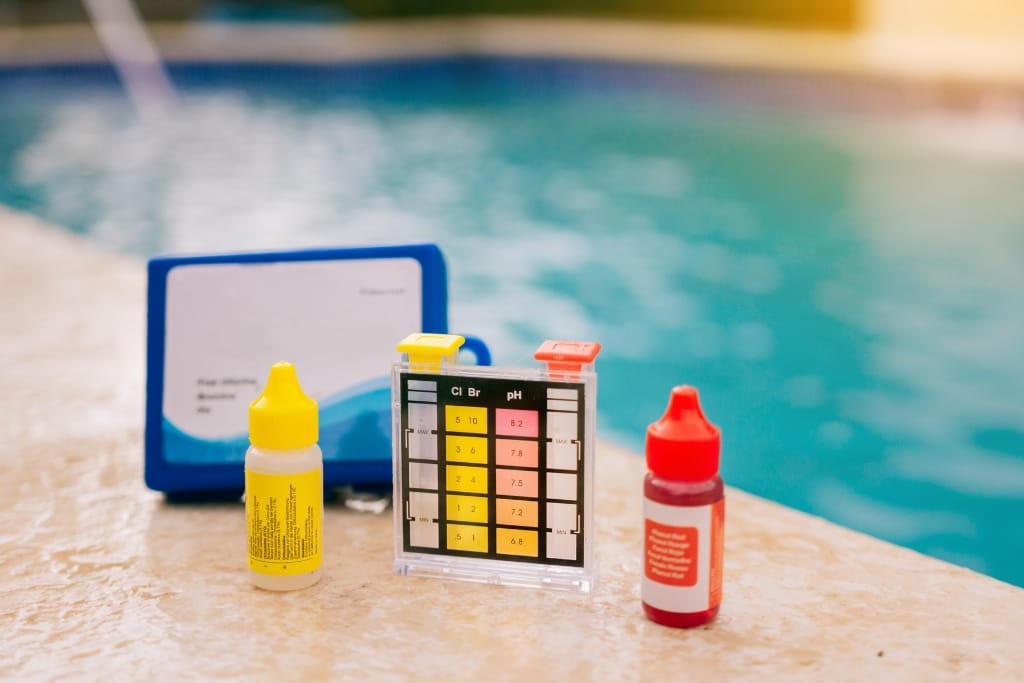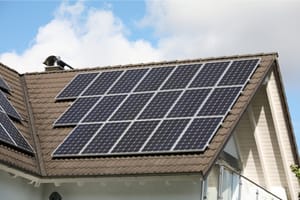Swimming pools are a great addition to any home. They are perfect for relaxing, cooling down on a hot day, or even entertaining guests.
However, owning a swimming pool isn't all about fun and games; it also requires maintenance to ensure the water remains clean and safe.
Swimming pool maintenance can be a daunting task, but with the right tips, it can be a breeze.
Here are 10 tips on swimming pool maintenance that you should know.
1)) Test The Water
Testing the water is an essential aspect of swimming pool maintenance.
You should test the water at least once a week, especially during the hot summer.
Testing the water helps you know what chemicals are needed to balance the pH levels, chlorine, and other levels to keep the water safe and clean for swimming.
Tips for Effective Water Testing:
- Use Reliable Testing Kits: Ensure to use a trustworthy and accurate pool testing kit. These kits will help you accurately measure the pH, chlorine, and alkalinity levels in the pool water.
- Consistent Testing Routine: Develop a regular testing schedule, preferably once a week. Consistent testing allows you to detect any water balance issues promptly and take corrective measures before they escalate.
- Seek Professional Assistance: If you're unsure about the results or if the water balance seems consistently off, don't hesitate to reach out to a pool maintenance professional. They can provide expert advice and guidance to keep your pool in optimal condition.
Regular and accurate water testing is a critical element of swimming pool maintenance.
By using reliable testing kits, maintaining a consistent testing routine, and seeking professional assistance when needed, you can ensure a healthy and safe swimming environment.
A well-maintained pool is the key to enjoying all the benefits that come with owning one.
2)) Skim The Pool
Skimming the pool should be done frequently. Removing leaves, bugs, debris, and other unwanted substances from the water helps prevent them from sinking to the bottom of the pool, which can make cleaning a more daunting task.
Tips for Efficient Pool Skimming:
- Use the Right Skimmer: Invest in a durable and good-quality pool skimmer. A long-handled net skimmer will help you reach further distances and clean more efficiently.
- Establish a Skimming Routine: Just like testing, regular skimming is crucial. Aim to skim your pool daily, especially after windy days or storms when debris may be more common.
- Remove Debris from Surrounding Areas: To minimize the amount of debris that gets into your pool, make sure to clean the surrounding areas regularly. Trim any overhanging branches and rake away leaves and grass cuttings.
Regular skimming is integral to maintaining a clean and healthy pool.
By investing in the right skimming tools, establishing a regular skimming routine, and keeping the area around your pool clean, you can greatly reduce the amount of debris in your pool.
Skimming not only keeps your pool looking pristine but also makes the overall maintenance process much easier.
3)) Maintain The Filter
The filter is a fundamental part of the pool's maintenance routine. Clean it regularly and change the cartridge at least twice a year.
Tips for Effective Filter Maintenance:
- Understand Your Filter: Filters come in different types - sand, cartridge, and diatomaceous earth. Each type requires a unique maintenance routine. Hence, it's essential to understand the type of filter your pool uses and its specific maintenance requirements.
- Regular Cleaning: Depending on the filter type, establish a regular cleaning schedule. For instance, cartridge filters should be removed and cleaned every few weeks, while backwashing should be done for sand and diatomaceous earth filters.
- Timely Replacement: Replace the filter components as recommended by the manufacturer. Typically, cartridges need to be replaced every 2-3 years, while sand should be replaced every 5-7 years. With a diatomaceous earth filter, the entire unit should be replaced every 10 years.
Proper filter maintenance is pivotal for the overall upkeep of your swimming pool.
By understanding your filter type and its specific requirements, maintaining a regular cleaning schedule, and replacing components timely, you can ensure the efficiency of your filter system.
A well-maintained filter system helps keep your pool water clean and clear, contributing significantly to a safe and enjoyable swimming experience.
4)) Shock The Pool
Shocking the pool means super chlorinating the water with a chemical shock. It would help if you shocked the pool at least once a week to kill bacteria and algae that may be lurking in the water.
Tips for Effective Pool Shocking:
- Use High-Quality Shock Products: Always opt for high-quality and reliable pool shock products. These should be able to effectively eliminate bacteria, algae, and other organic contaminants from your pool water.
- Follow Manufacturer Instructions: Each shock product comes with its own set of instructions. Ensure you read and follow these instructions carefully for safe and effective pool shocking.
- Shock during Dusk or Night: It's recommended to shock your pool during dusk or at night. This is because sunlight can degrade chlorine levels, reducing the effectiveness of the shocking process.
Proper pool shocking is a critical part of maintaining a clean, healthy, and swim-ready pool.
Utilizing high-quality shock products, adhering to manufacturer instructions, and performing the shock treatment during dusk or night can dramatically enhance the effectiveness of the process.
A well-shocked pool is a clear pool, free from bacteria and algae that can compromise both the enjoyment and safety of your swimming experience.
5)) Brush The Walls
Brushing the walls of the pool is essential to prevent the buildup of algae, calcium deposits, and other substances that can cling to the walls of the pool.
Brushing the walls helps prolong the life of the pool's surface.
Tips for Effective Pool Wall Brushing:
- Use the Right Brush: Depending on the material of your pool's walls, you should choose a suitable brush. Stainless steel brushes are ideal for concrete pools, while nylon brushes work well for vinyl or fiberglass surfaces.
- Establish a Regular Brushing Routine: Brush your pool walls at least once a week to prevent the build-up of algae and other unwanted substances. More frequent brushing may be necessary for pools that receive heavy use or are located near trees or plants.
- Brush from Top to Bottom: Start from the waterline and brush downwards. This method ensures that any dislodged debris can be easily vacuumed or filtered out from the bottom of the pool.
Regularly brushing your pool walls is a key aspect of pool maintenance.
Using the appropriate brush for your pool's surface material, setting up a consistent brushing schedule, and employing the top-to-bottom brushing technique, can greatly improve the cleanliness and longevity of your pool.
Consistent brushing prevents the accumulation of potentially damaging substances like algae and calcium deposits, ensuring a clean, refreshing, and appealing swimming environment.
6)) Check The Water Level
The water level in the pool should always be at the halfway mark of the skimmer. If the water level is too low, it can cause the pool pump to malfunction or even damage the pool's equipment.
If the level is too high, it can cause water to spill over the edge of the pool.
Tips for Effective Water Level Checks:
- Regular Monitoring: Make it a habit to check the pool’s water level at least once a week, especially after a heavy rainfall or a busy pool day. This will help you react quickly whenever the water level is too high or too low.
- Use a Pool Skimmer as a Guide: The ideal water level is at the halfway point of your pool skimmer. Utilize this as a visual guide when checking the water level.
- Adjust Accordingly: If the water level is too high, use a pool pump to remove the excess water. If it's too low, simply add water using a hose until it reaches the desired mark. Maintaining the correct water level protects the efficiency and longevity of your pool equipment.
Keeping a vigilant eye on your pool's water level is crucial to keep your pool's equipment functioning optimally and prevent potential damage.
By routinely monitoring the water level, using your skimmer as a reference point, and promptly adjusting the water level when necessary, you can maintain the perfect balance in your pool.
A properly managed water level not only ensures the efficient operation of your pool but also enhances the safety and enjoyment of your swimming experience.
7)) Cover The Pool
Covering the pool when not in use can help prevent debris and unwanted substances from entering the water.
A pool cover helps keep the water cooler on hot days and warmer on cooler days, which saves on the energy used to heat the pool.
Tips for Effective Pool Covering:
- Choose the Right Pool Cover: Not all pool covers are created equal. Select a cover that is durable, easy to use, and fits your pool's specific dimensions perfectly. A solar cover can be a good option to help retain heat and reduce evaporation.
- Cover the Pool when not in Use: Put on the pool cover whenever the pool is not in use, especially overnight and during off-seasons. This can prevent debris from accumulating in the water and save on cleaning efforts.
- Secure the Cover Properly: Ensure that the pool cover is securely fastened to prevent it from being blown away by wind or easily removed by children or pets. Properly securing the cover also ensures that it effectively keeps out debris and maintains the water temperature.
Properly covering your pool when not in use is an easy yet impactful step in maintaining your pool's cleanliness and energy efficiency.
By choosing the right cover for your pool, using it consistently, and ensuring it is securely fastened, you can significantly reduce debris, manage water temperature, and save on heating costs.
A covered pool is a well-protected pool, enhancing your swimming experience while reducing maintenance efforts.
8)) Regularly Clean The Pool Deck
Clean the pool deck regularly to prevent dirt, debris, and unwanted substances from getting into the pool.
Dirt and debris on the pool deck can easily slip into the pool when someone steps on it, causing the water to become dirty.
Tips for Effective Pool Deck Cleaning:
- Establish a Cleaning Routine: Regular cleaning is the key to a tidy pool deck. Schedule routine cleanings, such as sweeping and washing the deck, to keep the area free from debris and dirt.
- Use Appropriate Cleaning Products: Depending on the material of your pool deck, choose suitable cleaning products. For example, a non-abrasive cleaner works well for wood decks, while a mild detergent is good for concrete decks.
- Consider Pressure Washing: For more stubborn dirt and grime, consider pressure washing your pool deck. However, ensure it's done properly and sparingly to avoid any potential damage to the deck's surface.
Routine and efficient cleaning of your pool deck plays a pivotal role in maintaining the cleanliness of your pool and ensuring a pleasant poolside environment.
By setting up a regular cleaning schedule, using appropriate cleaning products, and resorting to pressure washing for stubborn dirt, you can prevent unnecessary debris from spoiling your pool's cleanliness.
A clean pool deck contributes to a clean pool, enhancing the overall swimming experience for everyone.
9)) Use Algaecide
Using algaecide regularly in your pool helps to kill algae and prevent it from forming, reducing the time and effort needed to keep the pool clean.
Tips for Effective Use of Algaecide:
- Understand Your Pool's Needs: Different pools may require different types and amounts of algaecide, depending on factors such as pool size, frequency of use, and local climate. Understand your pool's specific needs before selecting an algaecide.
- Follow Manufacturer's Instructions: Always adhere to the manufacturer's instructions when using algaecide. This ensures you use the correct quantity, apply it properly, and optimize its effectiveness.
- Regular Application: Apply algaecide regularly, typically once a week, to prevent the growth and spread of algae. Regular application helps maintain a clean, clear pool with less effort and cost in the long run.
The regular use of algaecide as part of your pool maintenance routine can dramatically minimize the presence of algae, simplifying your cleaning tasks and enhancing the clarity of your pool water.
By understanding your pool's unique requirements, adhering to the manufacturer's guidelines, and applying the algaecide consistently, you are directly contributing to a cleaner, healthier, and more enjoyable swimming environment.
Preventative measures like regular algaecide application can save you significant time, effort, and cost in the long run.
10)) Hire Pool Professionals
Hiring a professional pool service company can help you maintain your swimming pool more efficiently.
They have the necessary tools, knowledge, and expertise required to ensure your pool is always in top condition.
Tips for Hiring Pool Professionals:
- Verify Credentials: Ensure the professionals you hire are certified, have adequate experience, and come with positive customer reviews. This will reassure you of their competence and reliability.
- Understand the Scope of Service: Be clear about what services are included in their package. This may range from cleaning and chemical balance checks to equipment inspection, repairs, and replacements.
- Compare Prices: Shop around and compare the pricing of different service providers. While cost is a factor, it shouldn't compromise the quality of care your pool receives.
Enlisting the help of professional pool services can be a game-changer in maintaining your swimming pool's pristine condition.
By ensuring they possess the right credentials, understanding the scope of their services, and comparing prices across different providers, you can find the best fit for your pool's needs.
A pool is a significant investment - entrusting its care to professionals ensures its longevity and enhances your enjoyment of this valuable asset.
Conclusion
Maintaining a swimming pool is a meticulous but rewarding process. From regular cleaning of the pool deck to the effective use of algaecides and hiring professionals, every step contributes significantly to the cleanliness, safety, and longevity of your pool.
With the right approach and commitment to these outlined practices, you can ensure a crystal clear, inviting pool that enhances your home's appeal and provides endless enjoyment.
A well-maintained pool is not only a personal pleasure but also a testament to responsible ownership.
Related Articles and Guides
- How To Clean Tile Grout In Swimming Pool
- How To Vacuum Clean A Swimming Pool
- How To Clean A Green Algae Swimming Pool
- How To Kill Black Algae In A Swimming Pool
- How To Get Rid Of Yellow Algae In Swimming Pool
- 10 FAQs About How To Get Rid Of Algae In Swimming Pool
- 10 Tips For Cleaning A Swimming Pool
- 10 Easy Pool Cleaning Hacks
Are You Looking For The Best Pool Builders In Sacramento CA? Click Here To Get In Touch With A Pool Building Expert Today!
Download Our Free E-book!








